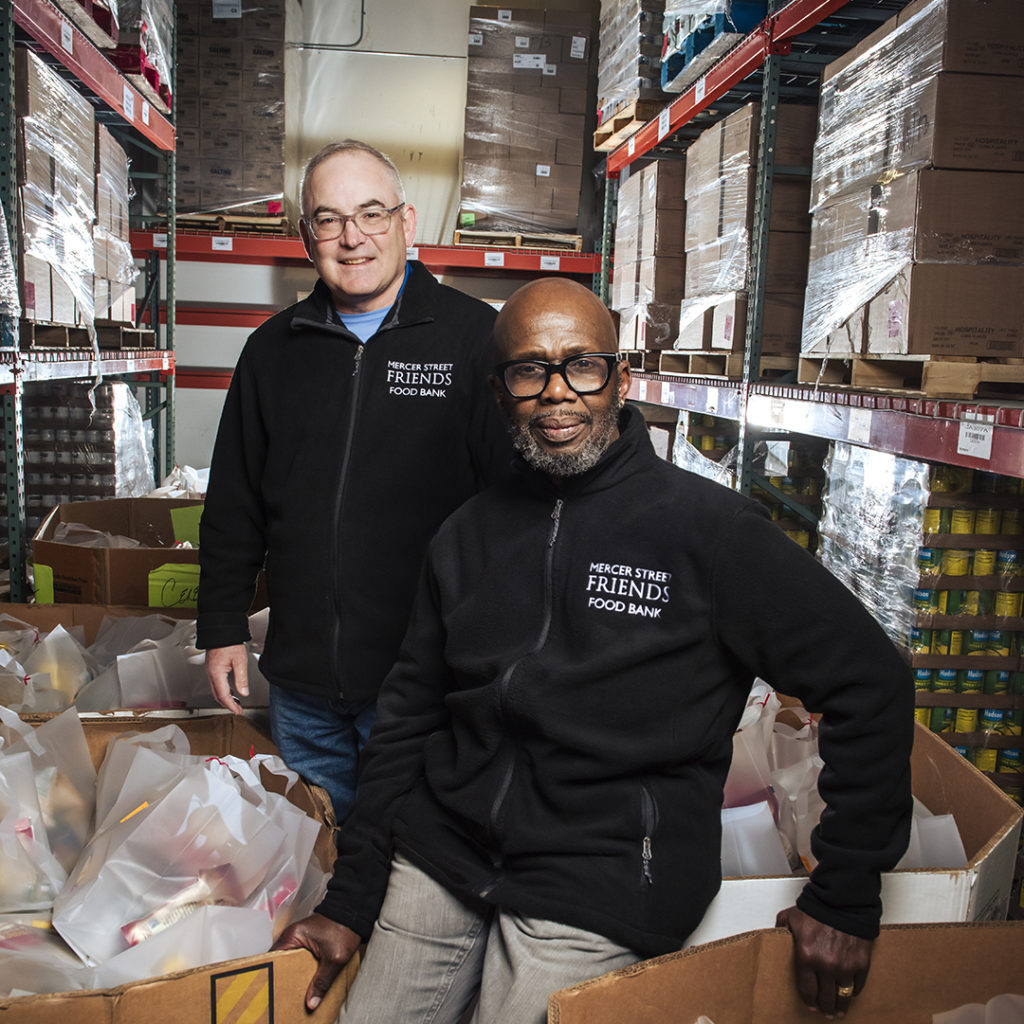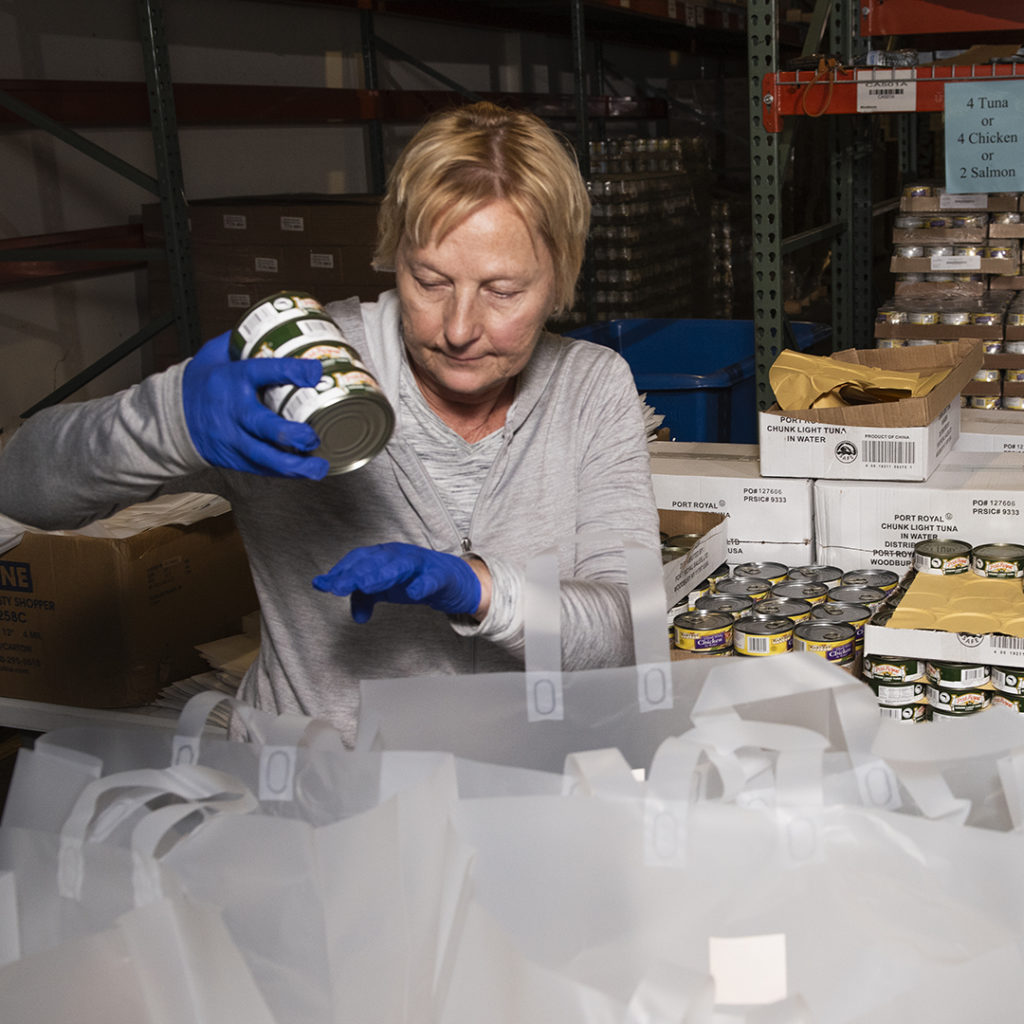Friends indeed
Mercer County’s largest food bank has more room to help — thanks to some chance TCNJ connections.

Four men, all with TCNJ connections, and one mission to help bring food to those who need it.
The cans and boxes were stacked high on pallets in a Ewing warehouse through the first frantic months of the pandemic in 2020 — beans, tuna, spaghetti, tomato sauce, cereal, fruit cups, and macaroni and cheese. Donations were up at the Mercer Street Friends food bank, but so was demand from the organizations it serves. The need was large and growing, but Mercer Street Friends’ warehouse space for food was small and stuffed.

James “Butter” Allen ’76 had started running the food bank just as the pandemic started and schools closed. Worried about the children who relied on school breakfasts and lunches, he launched a community food bag program and depended on a core group of 300 volunteers — team members, he prefers to call them — to fill 5,000 bags a month with food to give to those in need.
“We thought that would be just for the pandemic and then die out,” Allen says. “But it just continually grew.”
One of every 10 people in the county Mercer Street serves is considered food insecure — the bloodless government term that encompasses a third-grader distracted from math class by a rumbly stomach; a senior citizen trying to stretch a Social Security check across a month of meals; a parent weighing gas money to get to work against chicken legs for the kids for dinner. The Mercer County food insecurity rate roughly mirrors the national rate, which has been rising since the end of pandemic relief policies.
Now, three years since Allen had started the food bag program, his team fills 11,000 bags a month and the food bank channels about six million pounds of food to a network of more than 150 food pantries, shelters, soup kitchens, and social service sites. The operation has spilled into some adjacent space in the building, but that still hasn’t been enough. And, like the main warehouse, it doesn’t belong to Mercer Street Friends, the only food bank in New Jersey that rents, not owns, its facility. So, when the state made some money available to use for a down payment — $2 million — they started scouting for a home of their own. They first tried Trenton, where they started in 1958 as a community center in a defunct Quaker meeting house in the Mill Hill neighborhood. Nothing there worked. They looked elsewhere in Mercer County, where their food helps nourish 100,000 residents each month, but nothing quite fit.
But then, they heard about a place in Ewing that sounded just right: 42,000 square feet of warehouse, packing rooms, and office space. “I thought, ‘This is going to be good,’” says Allen. “This is our home.” But at the time, he didn’t yet know who owned it. “I went over and there was a sign that said, ‘Campus Fundraisers.’”
And it was right then that Allen said to himself, “I know these folks.”
It would have been hard to live on campus during Allen’s many years and jobs at TCNJ and not know him, or to call him anything but “Butter,” a nickname bestowed by his seventh-grade gym teacher. He first came to Trenton State in 1970 as part of the Upward Bound program. Then, as a sophomore studying political science and public administration, Allen worked as a dining hall assistant manager and hired a freshman history education major, Howie Dumhart ’77, as a dishwasher.
Dumhart was the first in his extended family to go to college, and he proved to be an exceptionally industrious worker, running the dish room with only his roommate after persuading Allen that the other dishwashers were just extra baggage. After graduating, he landed back at Trenton State, working as a residence hall director and studying for a master’s in education.
Steve Matejka, the director of the Lakeside residence halls at the time, was similarly industrious, and the two of them soon became entrepreneurial partners — investing in several thousand of the twistable plastic ice-cube trays that were then new to the market and selling them on weekends at the Englishtown Auction flea market, and running winter-break trips for students to Florida.
In the fall of 1981, Dumhart and Matejka had an idea that grew into a business that lasted for decades. Matejka was the advisor to the Residence Hall Association on campus, which wanted to raise some money. What about care packages — fruit baskets with notes from home that parents could have delivered to dorm rooms during final exams?
“The notes were pretty cool,” says Matejka. “You know, ‘Good luck on finals, we miss you, here’s a picture of your dog.’ We did a mailing to about 2,000 people and we got over 1,100 orders.”
They tried it again at the end of the spring semester. “We thought maybe it was just the holidays driving it,” Dumhart says. “But parents still bought in the springtime. That’s when we knew we had a real business.”
The two men worked out of the apartment where Matejka and his wife, NancyLee ’81, lived, and started Campus Fundraisers. They sold packages that included fruits, candy, and nuts in wicker baskets, and then expanded to other campuses: University of Delaware, Kean College, University of Pennsylvania, Montclair State, and Glassboro State. Soon there were nine schools, then 17, then 35 schools.
“We were getting 35, 40, 45 percent response rates,” Matejka says. “At the time, direct mail was happy if they were getting three, four percent response rates.”
Matejka left his residence hall job and campus apartment in 1985 to work full-time in the business. By then they had signed up about 90 schools with the same business model: partner with the schools, share the revenue. By 1990, they were large enough that they designed and built a warehouse with attached office space tailored to the workflow of the business: marketing, storing, assembling, and dispatching. Over the next 30 years, the company was sold several times, changed its name to On Campus Marketing, and broadened its offerings: welcome packages with first-aid kits, multitools, laundry bags, and other dorm essentials; extra-long linens for the extra-long twin beds in college dorms; comforters and pillows. When they signed up the University of Alaska they had reached all 50 states. By 2005, when Dumhart left, they were in 900 schools.
Matejka stayed until 2019, just before COVID closed campuses and eventually pushed the company into foreclosure. The building itself was rented out as storage space. “And then we got the call from Butter, who said, ‘I think I was just in your building,’” Matejka says.
After he retired in 2018 as CEO of NJM Insurance Group, Bernie Flynn went to TCNJ to study education, envisioning a second career as a teacher. “But once I spent a full semester in a second-grade classroom, I realized that teaching second grade was too hard,” he said. “I wanted to figure out what I was capable of doing, and I realized that I was more capable of being CEO of Mercer Street Friends than being a second-grade teacher.”

So in February 2020, that’s what he became, quickly hiring Allen as chief operating officer and food bank director. “Less than a year into our tenure, Butter and I realized that our strategy long term had to be for more warehouse space that we should own so that we could build an asset that would serve the community for decades to come,” he says. “We need to be here, and we need to be here for the long haul.”
Mercer Street wanted to buy Matejka and Dumhart’s building, but Matejka and Dumhart didn’t want to sell. Although their company had been bought and sold several times, they still owned the building, and they wanted to continue owning it. What about a lease? Mercer Street said no.
But Mercer Street was facing a deadline. The $2 million from the state was only available until June 30, 2023; it would evaporate if they didn’t use it by then. “I was not optimistic, but we said, let’s go back to Howie and Steve and talk to them,” Flynn says.
Things were different the second time around. “They started telling us their story and what their goals were,” says Matejka about Flynn and Allen. “And all of a sudden we all said, ‘Let’s try to make this thing work.’”
“We just came to a meeting of the minds,” Dumhart says. His daughter, like Matejka’s, had worked at HomeFront, which offers shelter, services, and food — much of it from Mercer Street Friends — to people without homes. Their discussions became as much about legacy as about business — about four men with deep TCNJ ties finding a way to better serve the 100,000 people who rely on Mercer Street. “The stars aligned, and it all seemed to make sense.”
The sale closed on June 2, with just four weeks to spare. “It’s interesting that now, 32 years later, a business that is different but very similar is utilizing the building,” Dumhart says. “The way I designed it you would have thought I designed it for Mercer Street Friends, because the businesses seem so synchronized.”
Allen, who was recently named to the Board of Trustees of TCNJ, is already plotting where everything will go when they move the whole operation to the new warehouse by early spring. “Empty there,” he says about the old building, “and fill here.”
He’s optimistic that an extra 7,500 square feet of warehouse space will make a real impact, noting the ability to purchase and store additional product when special pricing is available and room to prep and prepare more food bags for schools and our community. “It allows us to advance our part in addressing food insecurity for Mercer County,” he says.
Posted on February 5, 2024

